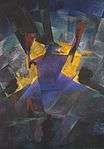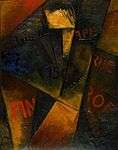Stanisław Kubicki
Stanisław Kubicki (November 7, 1889 in Ziegenhain – 1942 in Berlin) was a Polish painter, printmaker, member of the Expressionist movement in the arts and literature.[1]
Stanisław Kubicki | |
|---|---|
Stanislav Kubicki at the International Congress of Progressive Artists 1922 | |
| Born | Stanisław Kubicki November 7, 1889 Zeigenhain, Germany |
| Died | 1942 Berlin, Germany |
| Nationality | |
| Education | Bauakademie, Humboldt University, Academy of Arts in Berlin (neither completed) |
| Known for | Painting, printmaking, poetry |
| Movement | Expressionism Constructivism |
| Spouse(s) | Margerete Schuster |
Biography
Born as the sixth child of engineer Wital and his German mother, Maria Stark, a descendant of the architect Jakub Kubicki (1758-1833). In 1908, he began studying at the school of architecture in Bauakademie and at the Faculty of Philology at the Humboldt University of Berlin, as well as botanics and zoology. He completed neither course. He was part of the Society of Tomasz Zan and the "Grupa Narodowa" ("National Group"). He published his first works in the Berlin periodicals of "Die Aktion" and "Der Sturm". During this time, he married Margerete Schuster, he took her husband's surname and changed her name to Małgorzata.[2] In 1911, he renewed his studies at the Academy of Arts in Berlin, however, these were halted by the start of the First World War. He was drafted into the German Army and sent to Wielkopolska.
In 1918, he moved to Berlin, where, in 1922 he founded the "Progressive" group, displaying his artwork in Düsseldorf, Aachen, Amsterdam, Chicago and Moscow. In May 1922 he attended the International Congress of Progressive Artists and signed the "Founding Proclamation of the Union of Progressive International Artists".[3]
Until 1933, he cooperated with the news journal "a-z". During these years, he moved away from Expressionism becoming more involved with Cubism and Constructivism in his artwork. In 1933, Stanisław also founded the anarchist art group "Die Kommune".[4]
In 1933, he moved from Berlin to Poznań. Before World War II, he tried to move to the civil war torn Spain. He abandoned painting for literature and poetry.[5] During World War II, he helped the Home Army, acting as herald for the embassy of Manchuria in Berlin. The circumstances of his death are unknown, but were likely at the hands of the Gestapo. Stanisław Kubicki's resting place remains unknown.[6]
Selected paintings
 Little Town
Little Town
(1913).jpg) Tower of Babel II (version b)
Tower of Babel II (version b)
(1918) Autoportret VII
Autoportret VII
(1922) Moses and the Burning Bush
Moses and the Burning Bush
(1933) Incoming
Incoming
(before 1939)
References
- Urząd Wojewódzki w Poznaniu.; Wojewódzka Biblioteka Publiczna w Poznaniu. Kronika Wielkopolski (in Polish). Poznań: Poznań : Państwowe Wydawn. Naukowe.
- "Stanislaw Kubicki MoMA". The Museum of Modern Art. Retrieved 29 January 2017.
- van Doesburg, Theo. "De Stijl, "A Short Review of the Proceedings [of the Congress of International Progressive Artists], Followed by the Statements Made by the Artists' Groups" (1922)". modernistarchitecture.wordpress.com. Ross Lawrence Wolfe. Retrieved 30 November 2018.
- "Stanisław Kubicki - DESA Unicum". desa.pl. Retrieved 29 January 2017.
- Bartelik, Marek (2005). Early Polish modern art : unity in multiplicity. Manchester [u.a.]: Manchester Univ. Press. ISBN 0719063523.
- GmbH, Kulturprojekte Berlin. "Kubicki, Stanislaw". Berliner Themenjahr 2013 (in German). Retrieved 29 January 2017.
External links
![]()